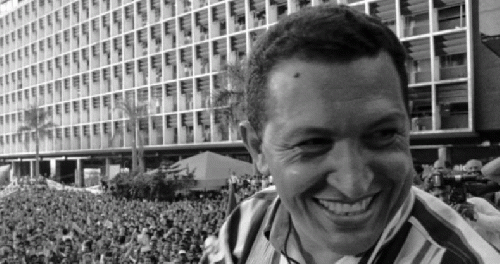In part III of his series, Reinaldo Iturriza recalls how Chavez drew strength from what appeared to be a political defeat for him.
When one decides to dedicate one's life to the gigantic mission of national liberation, social revolution, emancipation of the human species, one must learn how to deal with triumph and failure: with triumph to avoid becoming vain, and, eventually, adapting to new circumstances, putting away the flags and with failure, which happens recurrently, to gather strength to continue fighting.
We should understand that such a task implies swimming against the current all the time or, as Walter Benjamin would put it, brushing history against the grain, having to deal with a common sense tailor-made by the order or things one wishes to radically change. It also supposes a will to assume the consequences of going against criminal powers, moved above all by the drive for profit, and who are willing to do what it takes so as not to retreat one millimeter.
These powers do, of course, retreat in those shining moments of history when the peoples move forward through struggle, breathtaking episodes in which time stands still, only to then jump decades or centuries in a matter of days or years. But when these powers manage to retake the initiative, recover some of the lost ground, even go on the offensive, trampling over everything in their path, the peoples are stuck in the thickness of times that seem endless, labyrinthine, with no way out.
Now that the Bolivarian Revolution is going through such a difficult and exhausting moment, it's timely to recall one of the many episodes in which Hugo Cha'vez was close to surrendering and stepping aside.
In 1997, both Cha'vez and a small part of the Bolivarian Revolutionary Movement 200 (MBR-200) were convinced that it was impossible to take power via armed struggle, meaning that the idea to take part in the 1998 presidential elections should begin to be considered.
After leaving prison in 1994, and while he crisscrossed the country several times, Cha'vez recounted, "I dedicated myself to making contact with our military cadres who were still in the armed forces. They were under heavy surveillance, and had been dispersed towards the border. Talking and analyzing with them, I reached the conclusion that a new military movement was not viable. We lacked any actual military strength, and the element of surprise had vanished" (1). In contrast, "I understood directly in the streets, having travelled to towns and cities, that the impact of 4-F [attempted military uprising on February 4, 1992] was still alive and had a solid backing throughout the country." (2)
Cha'vez describes what happened when he proposed the electoral path for the first time, in a meeting in Cumana' with the leadership of the MBR-200 of Sucre State: "When we later adjourned to our quarters, my own bodyguards, who carried a pistol or an old rifle from the guerrilla times, came to talk to me. There were eight of them. They told me: 'Commander, we love you, but for elections count us out'." (3)
In Zulia State something similar happened: "I remember one night, in Maracaibo, when I made the proposal and we were about to begin discussing the issue" They opposed it, I don't remember a single person being in favor. I'm talking about regional cadres. In the national leadership there was more or less a split in opinions, but in most of the regions the opinion was that this [running in the election] meant betraying the movement and the people." (4)
The overall picture was truly disheartening: "Many comrades accused me of betraying the MBR-200, of falling prey to electoralism. They said the system was going to swallow us" I felt like I was sitting in the dock. I went through some dark days. After having created the MBR-200 and helping it grow throughout the country, the movement started radicalizing towards not taking part in elections. Voices that carried a lot of weight supported this. This current was gaining strength, repeating that running in elections was betraying the people, sinking the movement and letting down people's expectations." (5)
After meeting the movement's leadership in Ta'chira State, Cha'vez felt he could not go on: "We went to San Cristà �bal to another meeting, and the verdict was worse for me. I was tired, beat, disheartened. I told myself: 'Well, if that's the way it is, I'm out' ["] I remember talking to two comrades, founders of the movement ["] after finishing that meeting in San Cristà �bal, deep into the night, I asked them: 'Please take me to my father's farm.' Barinas is some three hours away. They agreed. I laid down in the car, I was sleepy, I was tired, my soul was tired. I asked myself: 'What have we created? What do these people want? Another military uprising? With what? For what?' No chance of success. I couldn't sway them! ["] I was tired above all. I felt an immense fatigue. I needed a solitary retreat" I spent about a week there, meditating, walking on the river banks" I was alone. Like Jesus in the desert. I didn't let anybody else come." (6)
There, in that remote location, "in that week of solitude and meditation I reached the conclusion that my analysis was correct. An inner voice told me to fulfill my duty and embrace that mission. I convinced myself that I should lead the country if I wanted to change it, and my first task was to convince my comrades. I went back into battle. I'm not one to surrender at the first hurdle ["] As Heraclitus used to say: 'Character is destiny'." (7)
Straight away, Cha'vez explains, "I convened a national congress of the MBR-200 to debate over several days. These were tough debates. I reminded them that, sometimes, if we don't want politics to be worse than it is, we need to act. And that, in some cases, implies as Max Weber used to say making a pact with the devil. Politics is not always for the pure of heart. It is human in the worst sense of the term. The only ones who believe perfection is possible in politics are the fanatics. In the end, a decision was made to have a widespread consultation. Some ["] did not accept it and left. But still, what mattered, beyond the feelings of the cadres, was the opinion of the people ["] Finally, in Valencia, on April 19, 1997, two decisions were made: first, to create a political electoral instrument; and second, to launch my pre-candidacy." (8)
This recounting has great meaning: what would have happened if Cha'vez could not have overcome the immense fatigue and opted to definitively step aside?
Nowadays it's fairly straightforward to take historical stock, and draw a line of continuity between the theoretical revolution that the Bolivarians, led by Cha'vez, engendered in the early 90s, when they discovered the strength of participatory, protagonist democracy; the emergence of Chavismo as a political subject, once the rebel military officers joined the popular classes, especially after 1994; the electoral victory in 1998; the successive popular victories in the early XXI century; and the death of Cha'vez in 2013, having led a revolution that for the majority represented the best moment in their history. But this trajectory could have been truncated as early as 1997, as Cha'vez himself explained.
(Note: You can view every article as one long page if you sign up as an Advocate Member, or higher).






